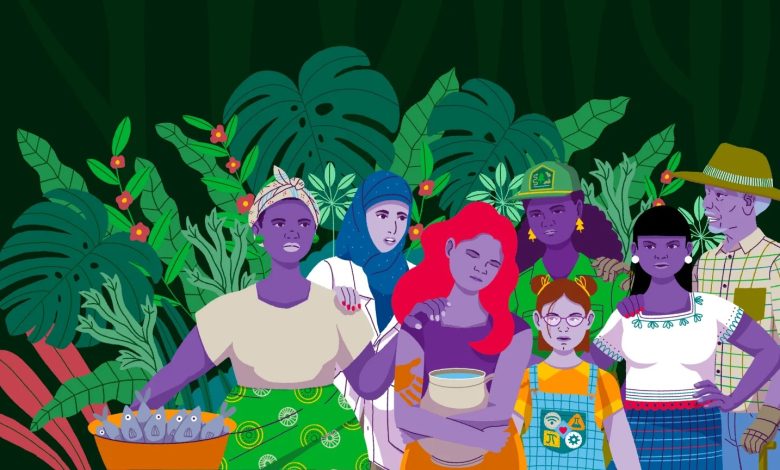The RISE challenge 2024 call for proposals (Grants:- USD100,000 And USD400,000)

Application window is now open
Call for proposals
Gender-based violence and environment linkages are complex and multi-layered; however, these threats to human rights and healthy ecosystems are not insurmountable. Urgent action to end GBV, promote gender equality and social inclusion and protect the environment is crucial – and requires cooperation and shared commitment across sectors.
The Resilient, Inclusive and Sustainable Environments (RISE) grants challenge is a first-of-its-kind grant fund that supports activities designed to address gender-based violence and environmental linkages in environmental and climate-related programmes and produce knowledge on promising interventions.
Funded by the United States Agency for International Development (USAID) and Norwegian Agency for Development Cooperation (Norad) and managed by IUCN, the RISE grants challenge is a direct response to a landmark study on gender-based violence and environment linkages by the International Union for Conservation of Nature (IUCN), which USAID’s Gender Equality and Women’s Empowerment Hub (GenDev) commissioned through the the Advancing Gender in the Environment (AGENT) partnership. With input from IUCN and diverse partners and peers, USAID designed this first-of-its-kind grants mechanism to fill knowledge, cooperation and investment gaps at the gender-based violence and environment nexus. In complement, IUCN launched the Gender-based Violence and Environment Linkages Center (GBV-ENV Center), which brings together resources and tools, mobilises learning, provides tailored technical support and forges collective action to build knowledge, capacities and improved policies. Since 2022, the RISE grants challenge has been managed and hosted by the IUCN, under the GBV-ENV Center.
The RISE grants challenge 2024 call for proposals is the fifth RISE grants challenge open call. A new cohort of RISE grantees will join the four previous cohorts, growing a community of practice and contributing to critical knowledge and strategies toward meeting interlinked global goals of eradicating gender-based violence and securing a healthy and peaceful planet.
Objective
The overarching purpose of the RISE grants challenge is to fund projects that address gender-based violence that is occurring within and linked to environment and climate-related sectors.
Scope
In 2024, the RISE grants challenge seeks proposals that adopt strategies to prevent, mitigate and respond to the risk of gender-based violence and environmental linkages in the context of the dual global biodiversity and climate crises. The RISE grants challenge will accept applications spanning diverse biodiversity and climate sectors and contexts, however, this year, there is also a specific earmark for at least several projects to specifically address gender-based violence in fisheries sectors.
The RISE grants challenge encourages applications that also deliver improved rights-based, gender-responsive, socially inclusive conservation, climate action and sustainable development. In 2024, we continue to be interested in intersectional approaches that include or emphasise vulnerable groups such as Indigenous women, environmental defenders, youth, and women and girls who are underrepresented and marginalised in their communities, among others.
Eligibility Requirements
Eligible countries in 2024
Eligible applicants
Partnership and collaborations
Local presence
Thematic responsiveness
Operational and administrative capacity
Language
SEAH policy
Self- and collective care
Eligible countries in 2024
RISE grants challenge projects must be implemented in one or more of the targeted 18 countries or be non-area based global policy focused projects:
Brazil
Colombia
Democratic Republic of the Congo
Ecuador
Ghana
Guatemala
Indonesia
Kenya
Madagascar
Mexico
Mozambique
Papua New Guinea
Peru
Philippines
Tanzania
Thailand
Vietnam
Zambia
The RISE grants challenge will also accept non-area based applications focused on global-level policy to address gender-based violence in environment programming.
Applying for a RISE grant: step by step
Stage 1 – Expression of interest stage
10 May to 7 June 2024
The 2024 call for proposal for the RISE grants challenge is launched.
The expression of interest is the first step in the RISE grants challenge application process. Submit your application through SMApply and submit any questions to RISE@iucn.org.
25 April 2024
Information webinar
The GBV-ENV Center will host a virtual information session covering the purpose, eligibility criteria and application components to support RISE grants challenge applicants. You can view the recording to support developing your Expression of Interest.
Register Here!
9 May 2024
Application window opens
Submit your Expression of Interest through SMApply
10 May 2024
Window for sending questions via email to RISE@iucn.org closes at 11:59 p.m. EST
Submit your questions via email to RISE@iucn.org between 25 April to 17 May 2024
17 May 2024
Frequently Asked Questions available online
Frequently Asked Questions, submitted to the RISE@iucn.org email, are available to the public on the official RISE website. Scroll down to the FAQ section to view them in English, Spanish and French
22 May 2024
Proposal submission deadline
Please submit your EOI digitally via the online application platform no later than 7 June 2024, at 11:59 pm EST. Late submissions will not be considered.
7 June 2024
Stage 2 – Eligibility screening stage
10 to 29 June 2024
Eligibility screening and selecting applicants for full proposal development
Applicants will undergo an initial eligibility screening to ensure they comply with the eligibility criteria included in section 4 of the call for proposals.
10 – 29 June 2024
Stage 3 – Invited proposal submission stage
1 July to 31 July 2024
Shortlisted expressions of interest are invited to submit full proposals
Shortlisted expressions of interest will be invited to submit detailed proposals through SMApply, including a budget, logframe, activity plan and environmental and social management questionnaire.
1 July – 31 July 2024
Technical application opens
The timeframe to submit questions to RISE@iucn.org also opens.
1 July 2024
Timeframe to submit proposal questions closes
The timeframe for sending questions via email to RISE@iucn.org closes. All questions and answers will be summed and shared with all proposal applicants.
15 July 2024
Proposal submission deadline
The RISE grants challenge technical proposal application window closes on 31 July. Please submit your proposal package digitally via SMApply by 31 July, 2024, at 11:59 pm EST. Please note that late submissions will not be considered.
31 July 2024
Stage 4 – Technical evaluation stage
1 August to 9 October 2024
Proposal shortlisting
The proposals will be evaluated and ranked by a Technical Evaluation Committee (TEC). Up to 12 applications will be shortlisted for the Steering Committee review.
1 August – 4 September 2024
Interviews
Up to 8 shortlisted applications will be invited to participate in a virtual interview with members of the Steering Committee.
6 September – 27 September 2024
Finalist notifications
The Steering Committee selects and notifies finalists to proceed to the due diligence stage.
30 September 2024
Stage 5 – Due diligence stage
30 September to 1 December 2024
Finalist due diligence
Selected finalists undergo a due diligence process. With no exception, final selection is conditional on a successful due diligence process.
30 September – 1 December 2024
Stage 6 – Grant winners finalisation
1 December to 31 December 2024
Signing grant agreements
Grant agreements are signed. All applicants will be informed about the results.
1 December to 31 December 2024
Interventions RISE seeks to fund
Partnerships between environmental, gender equality and GBV-expert, indigenous peoples and/or community-based organisations, networks or decision-makers
Locally or community-led or driven approaches, in line with rights-based principles and approaches;
Survivor-centred and trauma-informed approaches;
Proven or promising strategies to address gender-based violence in environment-focused sectors
Engage men and boys on positive masculinities to address gender-based violence and environment linkages and related harmful social norms
Women’s economic empowerment activities that include gender-transformative approaches, such as engaging men and the wider community, as a gender-based violence prevention strategy
Strategies, tools and capacities contributing to the overall global knowledge and capacity base to address GBV and environment linkages
Institutional learning to improve implementation and scale-up of rights-based gender-responsive environment approaches and outcomes
Innovative arrangements – e.g., via partnerships, institutional enabling conditions, policy reform or social protection measures – that contribute to existing evidence on addressing gender-based violence in environment linkages
Enabling conditions to implement interventions to reduce gender-based violence and support survivors, for example through legislative action, infrastructure or institutionalisation, or mobilising political will
Bridging knowledge gaps, for example through deepening local and contextual knowledge; showcasing context-specific promising practices; and/ or demonstrating how RISE grantees’ interventions will influence national, regional or global policy and programming agendas
RISE webinar on why and how to apply
On May 9 2024, the GBV-ENV Center hosted a virtual information session covering the purpose, eligibility criteria and application components to support RISE grants challenge applicants. You can view the recording to support developing your Expression of Interest both here and on our YouTube channel for Spanish and French versions.
Frequently Asked Questions (FAQ)
A virtual webinar explaining the purpose, eligibility criteria and application components was held on 9 May 2024 and the window to submit questions to the RISE team via email ended on 17 May 2024. All questions have been collated and summarized, and corresponding answers are available below in English, French, and Spanish.
